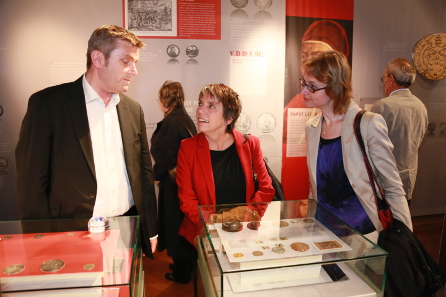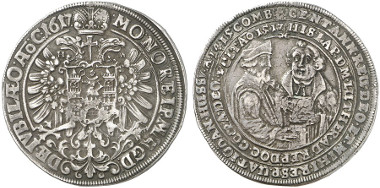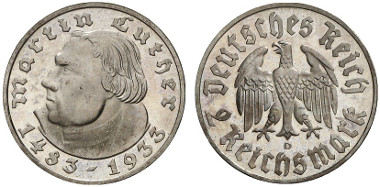by Elisabeth Doerk
May 22, 2014 – The prestigious premises of the Wartburg were the location where an exhibition of a special kind was opened on Sunday, 4 May. More than 100 coins and medals covering 500 years of reformation provide an insight into the history of Protestantism and the world of numismatics in an entertaining way. The date of the opening wasn’t chosen randomly but with care: it coincided with the anniversary of Luther arriving at the Wartburg in 1521. Thus, the special exhibition takes one of the important sites of events up since it, too, begins with an exhibit from 1521 depicting the reformer from Wittenberg.
Dr Rainer Opitz, lender of the majority of exhibits, Prof Dr Dr h.c. Margot Käßmann (Special Envoy of the Evangelical Church in Germany for the 2017 Reformation Jubilee 2017) as well as Katja Wolf, Mayor of the City of Eisenach (from left to right).
The festive opening was celebrated in the ceremonial hall of the Wartburg. Welcoming speeches were held by Burghauptmann (Castle Captain) Günther Schuchardt, Special Envoy of the Evangelical Church in Germany for the 2017 Reformation Jubilee 2017, Prof Dr Dr h.c. Margot Käßmann, Chairperson and Director of the Luther Memorials Foundation of Saxony-Anhalt, Dr Stefan Rhein, as well as initiator and sponsor of the exhibition, Fritz Rudolf Künker. Afterwards, curator Elisabeth Doerk gave a small tour through the exhibition.
The accompanying musical program, Beethoven’s “Rage over a Lost Penny” likewise touched upon a numismatic topic. Roughly 100 visitors attended the festivity and celebrated the latest exhibition with a reception held in the Wartburg café afterwards.
Magdeburg. Coins on the Reformation Jubilee 1617. Reichsthaler 1617. Rev. the reformers Johann Hus and Martin Luther. Dav. 5509. From auction sale Künker 237 (2013), 2308.
Not only to Martin Luther but to his contemporaries in general dealing with money, with interests and commerce were subjects of hot discussions. Due to deflation trends, people were more and more at a loss as to what their money was actually worth. Officially fixed exchange rates between the single denominations were ignored by the tradesmen, and he who wanted to pay with small coins was charged an additional fee. In addition, the minting authorities aimed at further diminishing the coins’ fineness.
Whereas the coins more and more ceased to serve as universal means of payment and value storage, another function of the coins gained in importance: conveying contents. Emperors and popes, secular and cleric rulers had had their mottos depicted on coins for centuries and used this medium for the representation of their power. The Protestant princes likewise used coins to propagate their Protestant faith on a broad scale.
In contrast to the inscriptions and depictions on coins that tended to stick to conventions to a greater extent, the depictions on medals, which served representational purposes and were given away as donatives, were much more straightforward. Since the middle of the 15th century, a new medium had come into being that was called schauthaler or, in modern language, medal. Originating from Italy where the painter Antonio Pisanello had created the very first portrait medal of a contemporary ruler, the art of designing medals also spread to the regions located north of the Alps. The free imperial cities of Nuremberg and Augsburg in particular became centers of the art of designing medals in the 16th century. The pieces enjoyed great popularity in the entire empire in the eras to come. Princes, but likewise wealthy patricians, scholars and merchants had themselves depicted on medals.
The expensive medals, however, were not for everyone to see. The specimens that had been commissioned by princes or privateers were manufactured only in small amounts and were for the most part presented as donatives to other princes, diplomats or, in a more private sphere, to friends. A baker, a peasant or a maidservant surely weren’t the ones this medium intended to address. In educated circles, on the other hand, the medals were much more sought-after. The reformer Philipp Melanchthon, for example, was a systematic collector of both ancient and contemporary medals.
German Empire. 2 reichsmark 1933 D. Luther. J. 352. Proof. From auction sale Künker 234 (2013), 5634.
The special exhibition “Reformatio in Nummis” presents a broad spectrum of coins and medals connected with the Reformation and its leading characters. “Reformation coins” and “Reformation medals” are by no means restricted to the 16th century. Thousands of different coins and medals address the Reformation and its repercussions, portray historical figures that had an impact on the course of the Reformation and refer to events that went down in the common historical knowledge. Including the jubilee and remembrance festivities on the occasion of Luther’s posting of his theses and the Augsburg Confession, the field of coins and medals on the Reformation reaches as far as the present.
A particular treat of the exhibition is the Martin Luther Medal of the Evangelical Church in Germany. With the aid of several medal design drafts and intermediate steps the manufacturing process of a piece can be reconstructed until the medal is finally finished. Personal comments provided by the artist Anna Franziska Schwarzbach invite to re-discover the medal as an artistic genre likewise of the present.
Auction house Fritz Rudolf Künker initiated and sponsored this exhibition to grab the chance to realize a numismatic presentation at a site that is visited by almost 350,000 tourists every year. Ulrich Künker says: “If we succeed in showing, even to just a fraction of the visitors, how colorful and inspiring dealing with coins can be then our investment in this project was more than worth it.”
“Reformatio in Nummis – Luther and the Reformation on Coins and Medals”
4 May – 31 October 2014
Wartburg, D-99817 Eisenach
phone: +49 3691 25 00
email: info@wartburg.de
Opening hours: 8.30 a.m.-5 p.m.
An exhibition catalog is available for purchase at the site.
More information on the castle is available on the website of the World Heritage site.







